2023年河南省人教新目标(Go for it)版中考英语二轮专题复习:专项9 动词时态(41张ppt)
文档属性
| 名称 | 2023年河南省人教新目标(Go for it)版中考英语二轮专题复习:专项9 动词时态(41张ppt) | 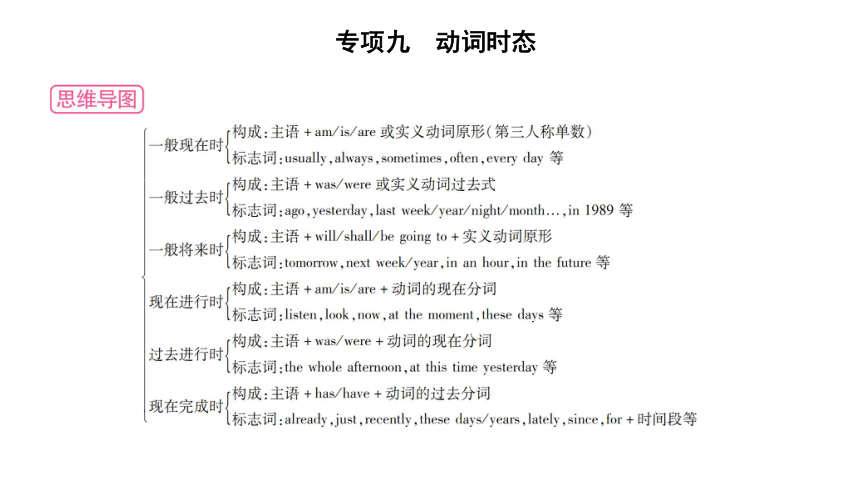 | |
| 格式 | zip | ||
| 文件大小 | 332.1KB | ||
| 资源类型 | 教案 | ||
| 版本资源 | 人教新目标(Go for it)版 | ||
| 科目 | 英语 | ||
| 更新时间 | 2023-03-25 12:01:09 | ||
图片预览

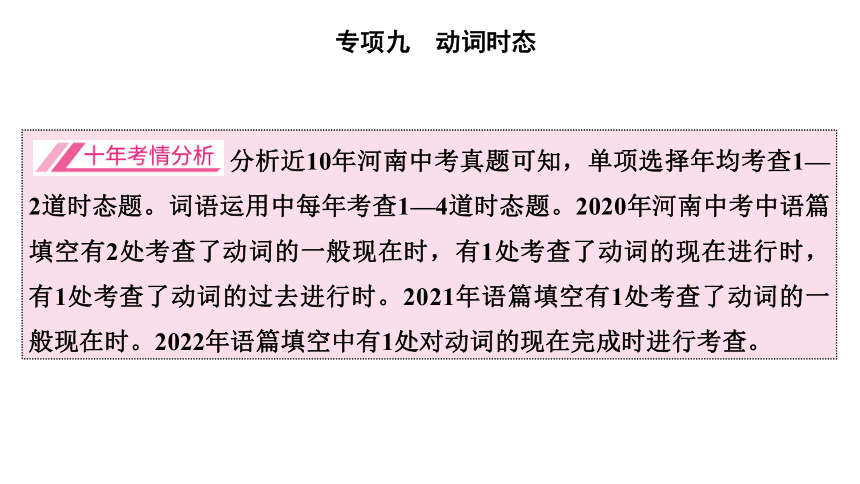
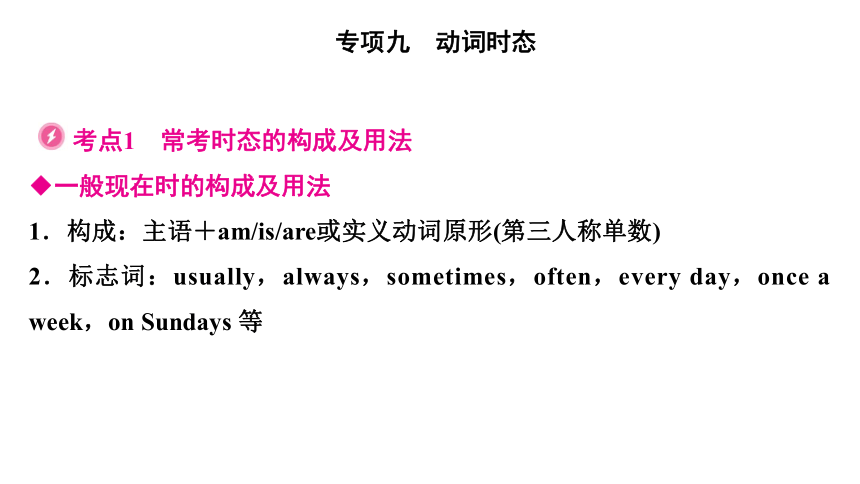
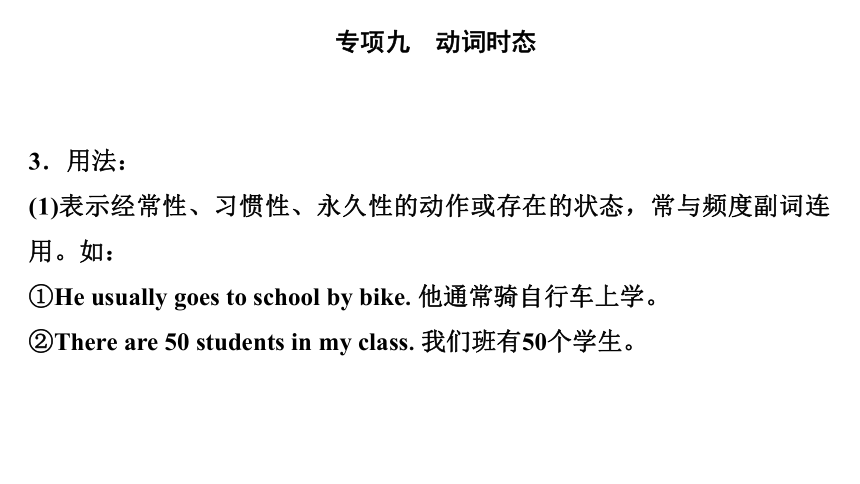
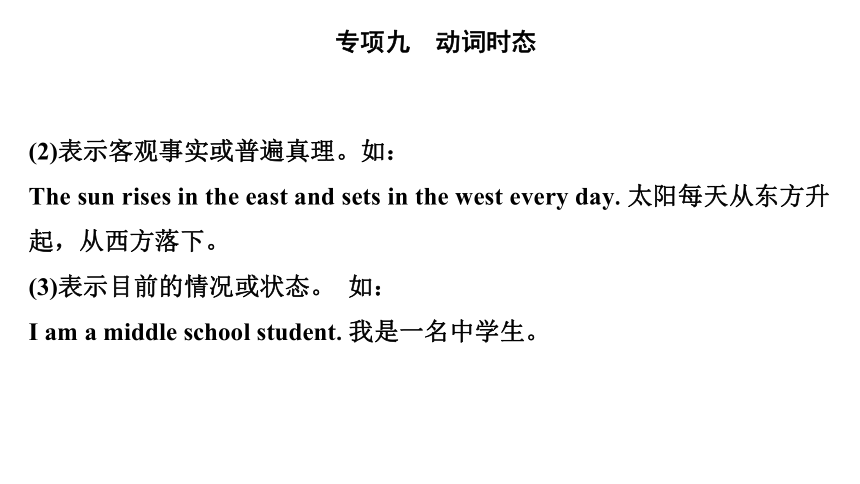
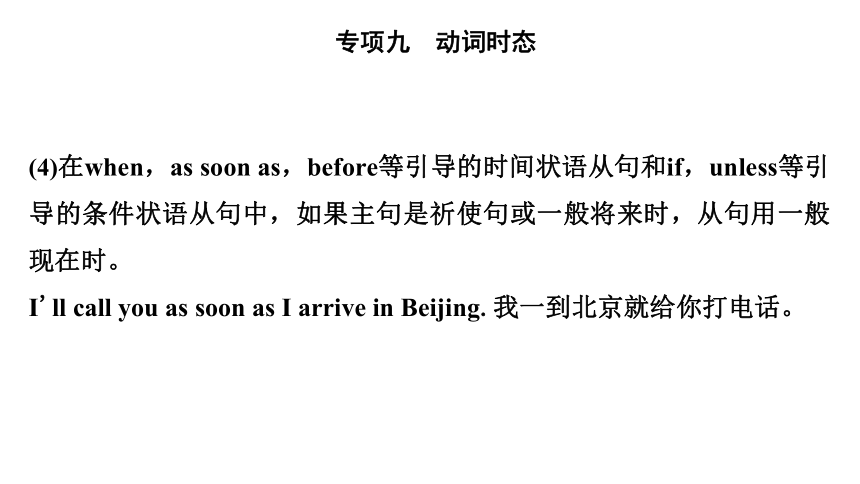
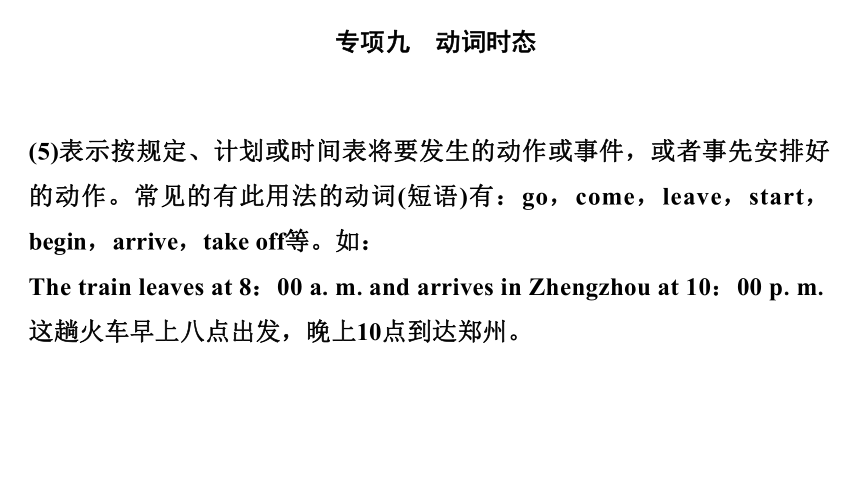
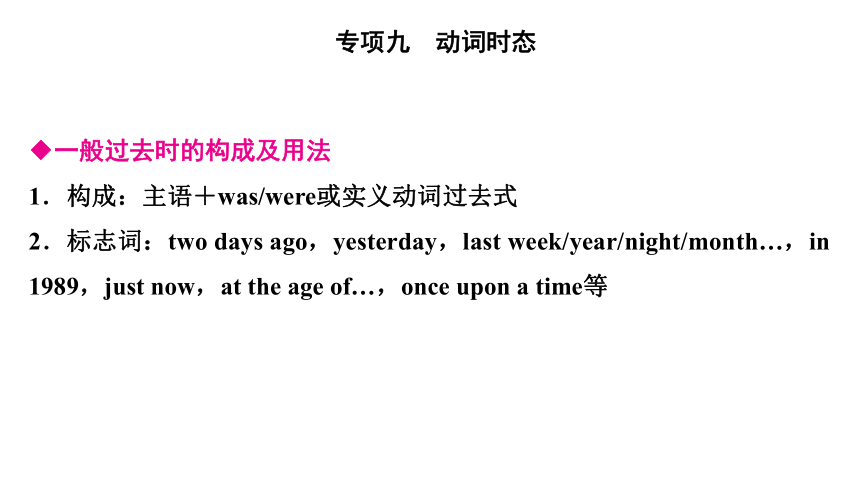
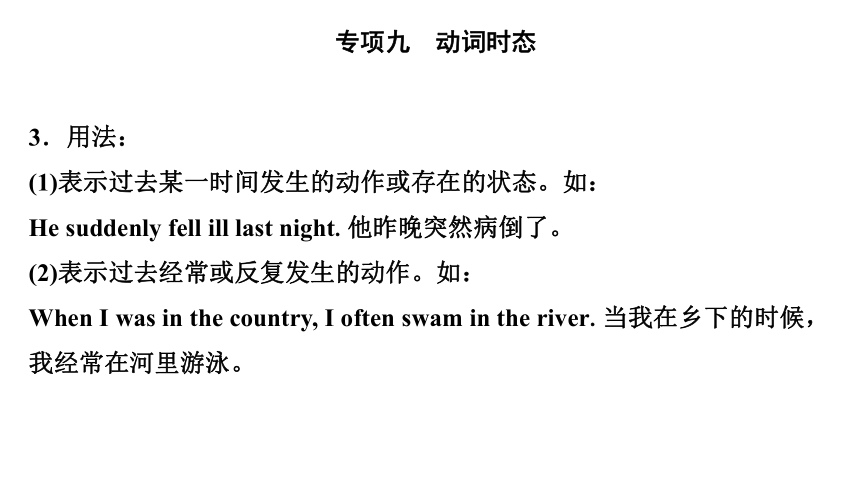
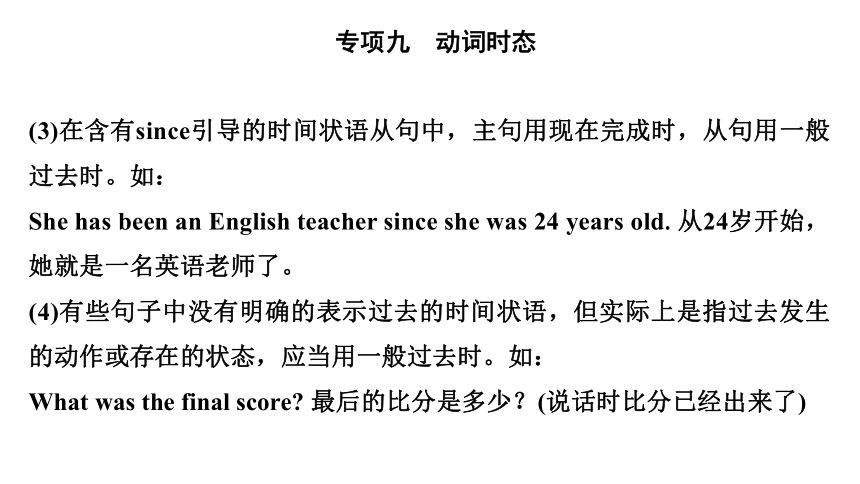
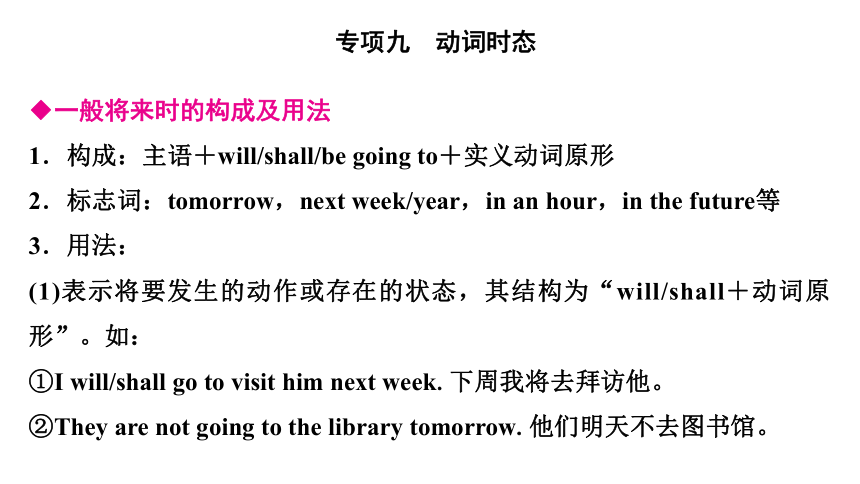
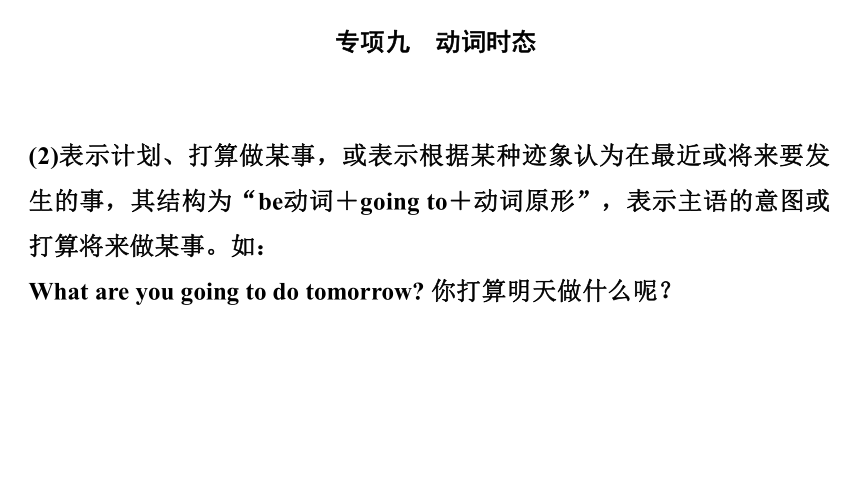
文档简介
(共41张PPT)
分析近10年河南中考真题可知,单项选择年均考查1—2道时态题。词语运用中每年考查1—4道时态题。2020年河南中考中语篇填空有2处考查了动词的一般现在时,有1处考查了动词的现在进行时,有1处考查了动词的过去进行时。2021年语篇填空有1处考查了动词的一般现在时。2022年语篇填空中有1处对动词的现在完成时进行考查。
考点1 常考时态的构成及用法
◆一般现在时的构成及用法
1.构成:主语+am/is/are或实义动词原形(第三人称单数)
2.标志词:usually,always,sometimes,often,every day,once a week,on Sundays 等
3.用法:
(1)表示经常性、习惯性、永久性的动作或存在的状态,常与频度副词连用。如:
①He usually goes to school by bike.他通常骑自行车上学。
②There are 50 students in my class.我们班有50个学生。
(2)表示客观事实或普遍真理。如:
The sun rises in the east and sets in the west every day.太阳每天从东方升起,从西方落下。
(3)表示目前的情况或状态。 如:
I am a middle school student.我是一名中学生。
(4)在when,as soon as,before等引导的时间状语从句和if,unless等引导的条件状语从句中,如果主句是祈使句或一般将来时,从句用一般现在时。
I'll call you as soon as I arrive in Beijing.我一到北京就给你打电话。
(5)表示按规定、计划或时间表将要发生的动作或事件,或者事先安排好的动作。常见的有此用法的动词(短语)有:go,come,leave,start,begin,arrive,take off等。如:
The train leaves at 8:00 a.m.and arrives in Zhengzhou at 10:00 p.m.这趟火车早上八点出发,晚上10点到达郑州。
◆一般过去时的构成及用法
1.构成:主语+was/were或实义动词过去式
2.标志词:two days ago,yesterday,last week/year/night/month…,in 1989,just now,at the age of…,once upon a time等
3.用法:
(1)表示过去某一时间发生的动作或存在的状态。如:
He suddenly fell ill last night.他昨晚突然病倒了。
(2)表示过去经常或反复发生的动作。如:
When I was in the country, I often swam in the river.当我在乡下的时候,我经常在河里游泳。
(3)在含有since引导的时间状语从句中,主句用现在完成时,从句用一般过去时。如:
She has been an English teacher since she was 24 years old.从24岁开始,她就是一名英语老师了。
(4)有些句子中没有明确的表示过去的时间状语,但实际上是指过去发生的动作或存在的状态,应当用一般过去时。如:
What was the final score 最后的比分是多少?(说话时比分已经出来了)
◆一般将来时的构成及用法
1.构成:主语+will/shall/be going to+实义动词原形
2.标志词:tomorrow,next week/year,in an hour,in the future等
3.用法:
(1)表示将要发生的动作或存在的状态,其结构为“will/shall+动词原形”。如:
①I will/shall go to visit him next week.下周我将去拜访他。
②They are not going to the library tomorrow.他们明天不去图书馆。
(2)表示计划、打算做某事,或表示根据某种迹象认为在最近或将来要发生的事,其结构为“be动词+going to+动词原形”,表示主语的意图或打算将来做某事。如:
What are you going to do tomorrow 你打算明天做什么呢?
(3)“be to+动词原形”和“be about to+动词原形”结构可以表示预先安排好的计划或约定,也可以表示说话人的意图、意志、职责、义务、命令。如:
①We are to leave for England next week.我们打算下周去英格兰。
②The ship is about to leave.船就要开了。
(4)表示某种必然的趋势。如:
Fish will die without water.鱼没有水会死。
辨析异同
辨析be going to和will
词(组) 含义及用法 示例
be going to 表示近期、眼下将要发生的事情 What are you going to do this weekend 你这周末打算干什么?
表示主观判断将来要发生某事 有“计划,准备”的意思 词(组) 含义及用法 示例
will 表示较远的将来 I'll become a scientist one day. 有一天我将成为一名科学家。
表示客观上将要发生某事 条件状语从句的主句中,多用will,不用be going to ◆现在进行时的构成及用法
1.构成:主语+am/is/are+动词的现在分词
2.标志词:listen,look,now,at the moment,these days等
3.用法:
(1)表示正在发生的动作。如:
Look at the children. What are they doing 看这些孩子们。他们在干什么?
(2)表示现阶段正在进行的动作或持续的状态。如:
—Is this raincoat yours?这件雨衣是你的吗?
—No, mine is hanging behind the door.不,我的就挂在门后。
(3)现在进行时可以表示将要发生的动作,即现在进行时表将来。不过这种用法常与arrive,begin,come,move,fly,go,get to,leave,return,start,stay等表示位移的动词搭配使用。如:
When are you going to Guangzhou 你打算何时去广州?
◆过去进行时的构成及用法
1.构成:主语+was/were+动词的现在分词
2.标志词:the whole afternoon,at this time yesterday等
3.用法:
(1)表示过去某一时刻或某一段时间内正在进行的动作。如:
—What were you doing at nine last night?昨晚九点你在干什么?
—I was watching TV.我正在看电视。
(2)表示一个过去的动作发生时,另一个动作正在进行。如:
I was watering the flowers when suddenly it began to rain.我正在给花浇水,突然开始下雨了。
(3)表示两个过去的动作同时发生。如:
I was doing my homework while my mother was cooking.当我妈妈正在煮饭时,我正在写作业。
由when 和while 引导的状语从句的复合句中,过去进行时的用法:
1.表示过去某一时刻一个动作发生时,另一个动作正在进行。
构成:(1)主句(过去进行时)+when引导的时间状语从句(一般过去时)
I was doing my homework when you called me.你打电话给我的时候,我正在做作业。
(2)主句(一般过去时)+while引导的时间状语从句(过去进行时)
The light went out while we were having supper.当我们正在吃饭时,灯熄灭了。
知识拓展
2.表示过去某一时刻两个动作同时进行。
构成:主句(过去进行时)+while引导的时间状语从句(过去进行时)
I was walking in the street while my mom was looking for me.我妈妈找我的时候,我正在街上散步。
◆现在完成时的构成及用法
1.构成:主语+has/have+动词的过去分词
2.标志词:already,just,recently,these days/years,lately,since+时间点,for+时间段等
3.用法:
(1)表示过去发生并已经完成的某一动作对现在造成的影响或产生的结果。如:
①I have spent all of my money so far.到目前为止,我已经花光了所有的钱。
②My father has gone to work.我父亲去上班了。
(2)表示发生在过去某一时刻,持续到现在的动作或状态。如:
Mr.White has lived here for 5 years.怀特先生在这里住了5年了。
辨析异同
1.辨析一般过去时和现在完成时
时态 区别 示例
一般过去时 强调过去某个时间发生的动作或状态,和现在的情况毫无联系 They lived here three years ago.他们三年前住在这里。(现在可能不在这里住了)
时态 区别 示例
现在完成时 强调过去的动作对现在造成的影响或产生的结果,与现在的情况有联系。也表示从过去开始持续到现在的动作或状态,也许还要持续下去 They have lived here since three years ago.他们三年前就住在这里了。(现在还在这里住)
2.辨析have/has gone to,have/has been to和have/has been in
词组 区别 示例
have/has gone to 表示去了某地,还没有回来,或者是在去某地的途中 Mr.Wang is not at home.He has gone to Shenzhen. 王先生不在家。他去了深圳。
词组 区别 示例
have/has been to 表示去过某个地方,不过现在已经回来了 My father has been to Shanghai twice.我父亲去过上海两次。
have/has been in 表示从过去持续到现在,一直呆在某个地方 Mr.Green has been in Hongkong since 1998.格林先生自1998年以来一直在香港。
1.The workers ______ cleaning the community center now.(盲填)
2.Don't lose heart.If you keep working hard, you ______ succeed some day.(盲填)
3.I _______ thinking about my sister when my phone rang. It was her!(盲填)
are
will
was
4.Jim has __________(talk) a lot about Chinese culture since he began to study in our school.
5.—Excuse me. What is Nick doing
—Look! He _____________(water) flowers outside.
talked
is watering
考点2 常见易混时态的辨析
一般过去时与现在完成时的易混辨析
两者都表示过去发生的事情。但一般过去时只强调过去发生的事情本身,不涉及与现在的关系;现在完成时则强调过去的动作对现在的影响,主要说明现在的情况。
表示“将来时态”几种形式的易混辨析
在初中阶段,我们学了“will/shall+动词原形”“be going to+动词原形”,现在进行时以及一般现在时等四种形式表达将来时。
1.will/shall+动词原形,表示单纯的将来(即现在之后)。如:
I will be back in five days.我将在五天后回来。(单纯将来)
知识拓展
在含有if引导的条件状语从句中,主句要用will表示将来时。如:
If it doesn't rain tomorrow, we will go climbing.如果明天不下雨,我们就去爬山。
2.be going to+动词原形,多用于口语,强调事先打算或准备好要做的事情或有某种迹象要发生的事情。如:
(1)What are you going to do this evening 你今晚准备做什么?(打算)
(2)Look! There are so many clouds in the sky.It's going to rain, I think.看!天空乌云密布。我觉得是要下雨了。(有迹象要发生的事情)
3.现在进行时表示即将发生的将来,多与表示位移的动词come,go,arrive,leave,fly,start等连用。如:
She is leaving for Beijing.她就要启程去北京。
4.一般现在时表示将来时,主要用于时间状语从句或条件状语从句中,或者用来表示按时刻表的规定将要发生的动作。如:
I'll tell him about it as soon as I see him.一见到他我就会告诉他这件事。
My plane takes off at six tomorrow morning.我的航班明天早上六点起飞。
用括号中所给动词的正确时态填空。
6.I ___________(have) this bike for three years. I like it so much.
7.—Lily, what do you usually do after school
—I ____(do) exercise with my friends.
8.Lingling met her favorite presenter while she ______________(visit) the radio station.
have had
do
was visiting
9.I don't know the words to a lot of songs, but I do know some folk songs that my grandma _________(teach) me at an early age.
10.—Is Helen here
—Not yet, but she _____________(arrive) in half an hour.
11.I ___________(have) a party next Saturday. I hope you can come.
taught
will arrive
will have
12.If we _________(support) each other, we'll always be OK.
13.Many children ________________(develop) the habit of washing hands these days.
14.Father's Day is around the corner. I _________________(buy) a gift for my father.
support
have developed
am going to buy
阅读短文,根据语篇要求填空,使短文通顺、意思完整。每空限填一词。
A dog and her baby dogs lived on a farm, where there was a well. The mother dog told her baby dogs not 15 go near the well or play around it. One of the baby dogs wondered 16 they shouldn't go to the well and decided to explore it. He went to 17 well. He climbed up the well and watched inside.
15._________ 16._________ 17.__________
to
why
the
In there, he saw his reflection and thought it was another dog. The baby dog saw that the other dog in the well (his reflection) 18 doing whatever he was doing. He got so angry that he decided to fight with the dog 19 jumped into the well, only to find no dog there. He barked and barked and swam until the farmer came and saved him. The baby dog learned his lesson.
18._________ 19._________
was
and
分析近10年河南中考真题可知,单项选择年均考查1—2道时态题。词语运用中每年考查1—4道时态题。2020年河南中考中语篇填空有2处考查了动词的一般现在时,有1处考查了动词的现在进行时,有1处考查了动词的过去进行时。2021年语篇填空有1处考查了动词的一般现在时。2022年语篇填空中有1处对动词的现在完成时进行考查。
考点1 常考时态的构成及用法
◆一般现在时的构成及用法
1.构成:主语+am/is/are或实义动词原形(第三人称单数)
2.标志词:usually,always,sometimes,often,every day,once a week,on Sundays 等
3.用法:
(1)表示经常性、习惯性、永久性的动作或存在的状态,常与频度副词连用。如:
①He usually goes to school by bike.他通常骑自行车上学。
②There are 50 students in my class.我们班有50个学生。
(2)表示客观事实或普遍真理。如:
The sun rises in the east and sets in the west every day.太阳每天从东方升起,从西方落下。
(3)表示目前的情况或状态。 如:
I am a middle school student.我是一名中学生。
(4)在when,as soon as,before等引导的时间状语从句和if,unless等引导的条件状语从句中,如果主句是祈使句或一般将来时,从句用一般现在时。
I'll call you as soon as I arrive in Beijing.我一到北京就给你打电话。
(5)表示按规定、计划或时间表将要发生的动作或事件,或者事先安排好的动作。常见的有此用法的动词(短语)有:go,come,leave,start,begin,arrive,take off等。如:
The train leaves at 8:00 a.m.and arrives in Zhengzhou at 10:00 p.m.这趟火车早上八点出发,晚上10点到达郑州。
◆一般过去时的构成及用法
1.构成:主语+was/were或实义动词过去式
2.标志词:two days ago,yesterday,last week/year/night/month…,in 1989,just now,at the age of…,once upon a time等
3.用法:
(1)表示过去某一时间发生的动作或存在的状态。如:
He suddenly fell ill last night.他昨晚突然病倒了。
(2)表示过去经常或反复发生的动作。如:
When I was in the country, I often swam in the river.当我在乡下的时候,我经常在河里游泳。
(3)在含有since引导的时间状语从句中,主句用现在完成时,从句用一般过去时。如:
She has been an English teacher since she was 24 years old.从24岁开始,她就是一名英语老师了。
(4)有些句子中没有明确的表示过去的时间状语,但实际上是指过去发生的动作或存在的状态,应当用一般过去时。如:
What was the final score 最后的比分是多少?(说话时比分已经出来了)
◆一般将来时的构成及用法
1.构成:主语+will/shall/be going to+实义动词原形
2.标志词:tomorrow,next week/year,in an hour,in the future等
3.用法:
(1)表示将要发生的动作或存在的状态,其结构为“will/shall+动词原形”。如:
①I will/shall go to visit him next week.下周我将去拜访他。
②They are not going to the library tomorrow.他们明天不去图书馆。
(2)表示计划、打算做某事,或表示根据某种迹象认为在最近或将来要发生的事,其结构为“be动词+going to+动词原形”,表示主语的意图或打算将来做某事。如:
What are you going to do tomorrow 你打算明天做什么呢?
(3)“be to+动词原形”和“be about to+动词原形”结构可以表示预先安排好的计划或约定,也可以表示说话人的意图、意志、职责、义务、命令。如:
①We are to leave for England next week.我们打算下周去英格兰。
②The ship is about to leave.船就要开了。
(4)表示某种必然的趋势。如:
Fish will die without water.鱼没有水会死。
辨析异同
辨析be going to和will
词(组) 含义及用法 示例
be going to 表示近期、眼下将要发生的事情 What are you going to do this weekend 你这周末打算干什么?
表示主观判断将来要发生某事 有“计划,准备”的意思 词(组) 含义及用法 示例
will 表示较远的将来 I'll become a scientist one day. 有一天我将成为一名科学家。
表示客观上将要发生某事 条件状语从句的主句中,多用will,不用be going to ◆现在进行时的构成及用法
1.构成:主语+am/is/are+动词的现在分词
2.标志词:listen,look,now,at the moment,these days等
3.用法:
(1)表示正在发生的动作。如:
Look at the children. What are they doing 看这些孩子们。他们在干什么?
(2)表示现阶段正在进行的动作或持续的状态。如:
—Is this raincoat yours?这件雨衣是你的吗?
—No, mine is hanging behind the door.不,我的就挂在门后。
(3)现在进行时可以表示将要发生的动作,即现在进行时表将来。不过这种用法常与arrive,begin,come,move,fly,go,get to,leave,return,start,stay等表示位移的动词搭配使用。如:
When are you going to Guangzhou 你打算何时去广州?
◆过去进行时的构成及用法
1.构成:主语+was/were+动词的现在分词
2.标志词:the whole afternoon,at this time yesterday等
3.用法:
(1)表示过去某一时刻或某一段时间内正在进行的动作。如:
—What were you doing at nine last night?昨晚九点你在干什么?
—I was watching TV.我正在看电视。
(2)表示一个过去的动作发生时,另一个动作正在进行。如:
I was watering the flowers when suddenly it began to rain.我正在给花浇水,突然开始下雨了。
(3)表示两个过去的动作同时发生。如:
I was doing my homework while my mother was cooking.当我妈妈正在煮饭时,我正在写作业。
由when 和while 引导的状语从句的复合句中,过去进行时的用法:
1.表示过去某一时刻一个动作发生时,另一个动作正在进行。
构成:(1)主句(过去进行时)+when引导的时间状语从句(一般过去时)
I was doing my homework when you called me.你打电话给我的时候,我正在做作业。
(2)主句(一般过去时)+while引导的时间状语从句(过去进行时)
The light went out while we were having supper.当我们正在吃饭时,灯熄灭了。
知识拓展
2.表示过去某一时刻两个动作同时进行。
构成:主句(过去进行时)+while引导的时间状语从句(过去进行时)
I was walking in the street while my mom was looking for me.我妈妈找我的时候,我正在街上散步。
◆现在完成时的构成及用法
1.构成:主语+has/have+动词的过去分词
2.标志词:already,just,recently,these days/years,lately,since+时间点,for+时间段等
3.用法:
(1)表示过去发生并已经完成的某一动作对现在造成的影响或产生的结果。如:
①I have spent all of my money so far.到目前为止,我已经花光了所有的钱。
②My father has gone to work.我父亲去上班了。
(2)表示发生在过去某一时刻,持续到现在的动作或状态。如:
Mr.White has lived here for 5 years.怀特先生在这里住了5年了。
辨析异同
1.辨析一般过去时和现在完成时
时态 区别 示例
一般过去时 强调过去某个时间发生的动作或状态,和现在的情况毫无联系 They lived here three years ago.他们三年前住在这里。(现在可能不在这里住了)
时态 区别 示例
现在完成时 强调过去的动作对现在造成的影响或产生的结果,与现在的情况有联系。也表示从过去开始持续到现在的动作或状态,也许还要持续下去 They have lived here since three years ago.他们三年前就住在这里了。(现在还在这里住)
2.辨析have/has gone to,have/has been to和have/has been in
词组 区别 示例
have/has gone to 表示去了某地,还没有回来,或者是在去某地的途中 Mr.Wang is not at home.He has gone to Shenzhen. 王先生不在家。他去了深圳。
词组 区别 示例
have/has been to 表示去过某个地方,不过现在已经回来了 My father has been to Shanghai twice.我父亲去过上海两次。
have/has been in 表示从过去持续到现在,一直呆在某个地方 Mr.Green has been in Hongkong since 1998.格林先生自1998年以来一直在香港。
1.The workers ______ cleaning the community center now.(盲填)
2.Don't lose heart.If you keep working hard, you ______ succeed some day.(盲填)
3.I _______ thinking about my sister when my phone rang. It was her!(盲填)
are
will
was
4.Jim has __________(talk) a lot about Chinese culture since he began to study in our school.
5.—Excuse me. What is Nick doing
—Look! He _____________(water) flowers outside.
talked
is watering
考点2 常见易混时态的辨析
一般过去时与现在完成时的易混辨析
两者都表示过去发生的事情。但一般过去时只强调过去发生的事情本身,不涉及与现在的关系;现在完成时则强调过去的动作对现在的影响,主要说明现在的情况。
表示“将来时态”几种形式的易混辨析
在初中阶段,我们学了“will/shall+动词原形”“be going to+动词原形”,现在进行时以及一般现在时等四种形式表达将来时。
1.will/shall+动词原形,表示单纯的将来(即现在之后)。如:
I will be back in five days.我将在五天后回来。(单纯将来)
知识拓展
在含有if引导的条件状语从句中,主句要用will表示将来时。如:
If it doesn't rain tomorrow, we will go climbing.如果明天不下雨,我们就去爬山。
2.be going to+动词原形,多用于口语,强调事先打算或准备好要做的事情或有某种迹象要发生的事情。如:
(1)What are you going to do this evening 你今晚准备做什么?(打算)
(2)Look! There are so many clouds in the sky.It's going to rain, I think.看!天空乌云密布。我觉得是要下雨了。(有迹象要发生的事情)
3.现在进行时表示即将发生的将来,多与表示位移的动词come,go,arrive,leave,fly,start等连用。如:
She is leaving for Beijing.她就要启程去北京。
4.一般现在时表示将来时,主要用于时间状语从句或条件状语从句中,或者用来表示按时刻表的规定将要发生的动作。如:
I'll tell him about it as soon as I see him.一见到他我就会告诉他这件事。
My plane takes off at six tomorrow morning.我的航班明天早上六点起飞。
用括号中所给动词的正确时态填空。
6.I ___________(have) this bike for three years. I like it so much.
7.—Lily, what do you usually do after school
—I ____(do) exercise with my friends.
8.Lingling met her favorite presenter while she ______________(visit) the radio station.
have had
do
was visiting
9.I don't know the words to a lot of songs, but I do know some folk songs that my grandma _________(teach) me at an early age.
10.—Is Helen here
—Not yet, but she _____________(arrive) in half an hour.
11.I ___________(have) a party next Saturday. I hope you can come.
taught
will arrive
will have
12.If we _________(support) each other, we'll always be OK.
13.Many children ________________(develop) the habit of washing hands these days.
14.Father's Day is around the corner. I _________________(buy) a gift for my father.
support
have developed
am going to buy
阅读短文,根据语篇要求填空,使短文通顺、意思完整。每空限填一词。
A dog and her baby dogs lived on a farm, where there was a well. The mother dog told her baby dogs not 15 go near the well or play around it. One of the baby dogs wondered 16 they shouldn't go to the well and decided to explore it. He went to 17 well. He climbed up the well and watched inside.
15._________ 16._________ 17.__________
to
why
the
In there, he saw his reflection and thought it was another dog. The baby dog saw that the other dog in the well (his reflection) 18 doing whatever he was doing. He got so angry that he decided to fight with the dog 19 jumped into the well, only to find no dog there. He barked and barked and swam until the farmer came and saved him. The baby dog learned his lesson.
18._________ 19._________
was
and
同课章节目录
- 词法
- 名词
- 动词和动词短语
- 动词语态
- 动词时态
- 助动词和情态动词
- 非谓语动词
- 冠词
- 代词
- 数词和量词
- 形容词副词及其比较等级
- 介词和介词短语
- 连词和感叹词
- 构词法
- 相似、相近词比较
- 句法
- 陈述句
- 一般疑问句和否定疑问句
- 特殊疑问句及选择疑问句
- 反意疑问句
- 存在句(There be句型)
- 宾语从句
- 定语从句
- 状语从句
- 主谓一致问题
- 简单句
- 并列句
- 复合句
- 主谓一致
- 主、表语从句
- 名词性从句
- 直接引语和间接引语
- 虚拟语气
- 感叹句
- 强调句
- 倒装句
- 祈使句
- 句子的成分
- 句子的分类
- 题型专区
- 单项选择部分
- 易错题
- 完形填空
- 阅读理解
- 词汇练习
- 听说训练
- 句型转换
- 补全对话
- 短文改错
- 翻译
- 书面表达
- 任务型阅读
- 语法填空
- 其他资料
